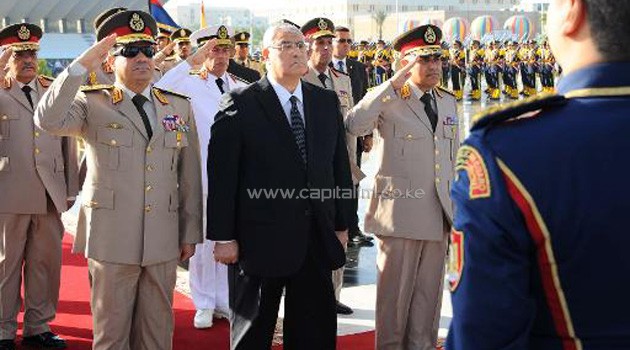
Picture released by the Egyptian Presidency shows Interim President Adly Mansour (C), Defense Minister Colonel General Abdul Fattah al-Sisi (L) and Chief of Staff Sedki Sobhi (R) reviewing troops on October 5, 2013 in Cairo/AFP
Cairo October 6- Egypt on Sunday braced for rival demonstrations called by supporters and opponents of deposed Islamist president Mohamed Morsi as it marks the 40th anniversary of the 1973 Arab-Israeli war.
The interior ministry warned it would “firmly confront” any violence at the demonstrations on Sunday, which aimed to converge at Cairo’s Tahrir Square, epicentre of the 2011 uprising against Hosni Mubarak.
Opponents of Morsi, who was ousted and jailed by the army on July 3, began gathering at the square from Saturday evening chanting pro military slogans, an AFP correspondent reported.
Authorities deployed several armoured vehicles around the square and installed metal detectors at two entrances to allow people inside. All other entrances were sealed.
The 1973 conflict, known as the October War in the Arab world and the Yom Kippur War in Israel, is remembered proudly by the Egyptian army because it caught Israel by surprise. The war ultimately led to the recovery of the Sinai Peninsula in a 1979 peace treaty.
“The Egypt Anti Coup Alliance repeats its call to all Egyptians to continue their protests in every part of Egypt, and to gather in Tahrir Square on Sunday, October 6, to celebrate the army of that victory and its leaders,” the pro Morsi Islamist group led by the Muslim Brotherhood said Saturday.
Attempts by Islamists to reach Tahrir Square on Friday had sparked clashes with Morsi opponents and security forces in which four people were killed, making it the deadliest street fighting in more than a month.
It was unclear whether the dead were Islamists or their opponents, but a medical official said none were security personnel.
Ahead of Sunday’s demonstrations, the interior ministry warned against “attempts that may disturb the October 6 celebrations in Egypt,” state news agency MENA quoted it as saying.
“The ministry asserts its determination to firmly confront all violence and infringements of law by the Muslim Brotherhood supporters through their marches.”
Calls for demonstrations on Sunday also came from the Tamarod movement, which led the nationwide protests that prompted the army’s ouster of Morsi, Egypt’s first democratically elected leader.
“We call all Egyptians to come out tomorrow across all squares in the country to assert that this nation will not allow its revolution to be stolen,” prominent Tamarod leader Mahmoud Badr told reporters Saturday.
Analysts said the Islamists’ call for protests on Sunday was a high-risk attempt to strip the current high military command of the army’s legacy and patriotic pride in the Arab Israeli conflict.
“They will try to show that the present army is not the army of all Egyptians, but only of those who backed the coup,” said Hassan Nafaa, political science professor at Cairo University.
“But this message will not go down well,” he told AFP.
The Anti-Coup Alliance has repeatedly called for protests against the military’s overthrow of Morsi, but its ability to mobilise large crowds has waned as security forces have arrested some 2,000 Islamists, including Morsi himself and several top Muslim Brotherhood leaders.
Egypt has been engulfed in political turmoil since Mubarak was toppled during the 2011 Arab Spring, but the conflict between Islamists and their secular rivals took a particularly violent turn after Morsi’s ouster.
Hundreds were killed on August 14 when security forces moved in to destroy two large protest camps set up by Morsi supporters in Cairo. Islamists elsewhere in Egypt struck back, attacking police and torching churches and other Coptic Christian institutions.
The government has also been battling an increasingly virulent insurgency in the Sinai, where militants have launched near daily attacks on police and military targets.
On Saturday, interim president Adly Mansour said in a televised speech that authorities will “defeat much hated terrorism and blind violence with the rule of law that will protect the freedom of citizens and resources.”









































